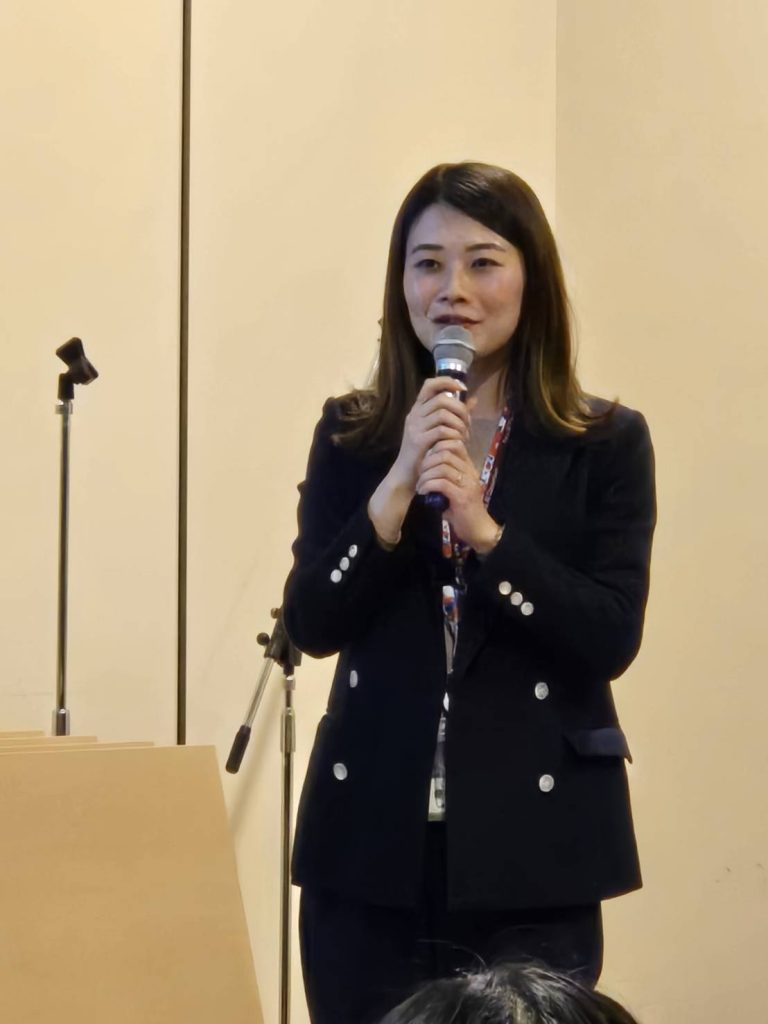
活動報告
Event
AIC Hosts Third “AIC Career Lab” Event
2025.03.12 written by
On March 12, 2025, AIC hosted the third “AIC Career Lab.”
This event served as a platform for students to think about their future careers, and included talks on the latest trends in the AI business and job hunting. In addition, Keio alumni who are active in various industries were also invited to share their experiences and knowledge via a roundtable discussion.
Talk by Yuki Takenaka from BizReach Campus
The first speaker, Yuki Takenaka, who was instrumental in launching BizReach Campus, took to the stage to speak on his own career transition and how his values evolved in tandem with changes in his career trajectory.
After joining Panasonic, he was involved in the development of service robots for medical and nursing care. He came to believe in the importance of “experience” while working on a total beauty solution for beauty salons leveraging robotics technology.
Subsequently, he was in charge of recruitment at Panasonic as a hiring manager, actively endeavoring to secure exceptional and talented personnel. It was during this stint that he became keenly interested in how to make the job hunting process more engaging and exciting. After his departure from Panasonic in 2016, he went on to found a company, GLROWS, to “update” the value of experiences. Right around that time, he met Soichiro Swimmy Minami, the founder of BizReach, and helped to launch BizReach Campus while managing his own company concurrently. Today, through overseeing the overall production at BizReach Campus and experiential design at his own company, Takenaka continues to provide new forms of “experience” and “entertainment” to job-hunting students.
For this session, Takenaka explored the theme “The Manufacturing Industry Today and Future Possibilities.” Posing the question “Is it true that the manufacturing sector has been on the decline in recent years?” as the basis for discussion, Takenaka explained the overall trends in the manufacturing industry based on his own experience working in the sector.
For instance, in the automotive industry, with the shift towards electric vehicles (EVs) from conventional gasoline vehicles, manufacturers involved in the development of battery technology and motors are garnering attention. However, the development of charging stations and other supporting infrastructure is essential for the mass adoption of EVs, and at present it is still inadequate. He also noted that the demand for gasoline-powered vehicles continues to rise in developing countries and that the market for such vehicles is likely to persist. In view of this, he posited that the future of the manufacturing industry is not bleak, and that new growth opportunities are emerging in response to the changing times.
With that, Takenaka presented on the current situation and future possibilities for the manufacturing industry, weaving in specific examples to illustrate the future outlook of the sector.
Talks by Keio Alumni
Following Takenaka’s talk, Keio alumni who are working in the manufacturing industry took to the stage to share their thoughts and experience on job hunting and their career paths after entering their respective companies.
First, an alumnus who works for Toyota Motor Corporation described the current trend toward “smart” automobiles. He emphasized that software development plays a critical role in today’s automotive industry, where differentiation from competitors is done through technological innovation.
Next, an alumnus who works for Sony spoke on the theme “Making Products That Are User-Friendly” and the sense of satisfaction he derives from his job. He explained that he was drawn to working in an environment in which products are delivered to everyday users and where he can receive direct feedback from them, which he finds very fulfilling.
An alumna who works for Panasonic also shared how her childhood interests have led her to pursue her current career trajectory. She further elaborated that she was drawn by the fact that manufacturers are not only involved in product development, but also in broader, more extensive projects, such as designing an entire city.
The invited alumni shared their experiences in their respective industries and discussed various career paths in manufacturing with specific cases and examples.


Panel Discussion
In the panel discussion that followed, the alumni answered questions about job hunting and career development, providing realistic answers based on their actual experiences.
In response to a straightforward question by one participant, who asked, “How does your salary compare with someone who works in a trading company or in consulting?” one of the alumni answered, “There is actually not that big of a difference when you calculate it on an hourly basis because of the intense workload and long hours that are typical in trading companies and consulting firms.” Another question was, “Why did you choose manufacturing?” to which the replies were, “The founder’s philosophy and corporate culture resonated with me,” and “I valued the interpersonal relationships there.”
There was also a comparison between electronics manufacturers, whereby participants discussed the difference in corporate culture between Sony and Panasonic, with Sony having a more liberal and free corporate spirit while Panasonic adheres to more traditional Japanese corporate norms. Participants went on to discuss assignments of job roles, with one participant chiming in that it was now easier to secure one’s desired role after entering a company, while another pointed out that it is important to have a good understanding of the company’s internal structure in order to do so.
This discussion served as an opportunity to ponder on the realities of the manufacturing industry and the criteria for deciding on a career.

Roundtable Discussion
For the roundtable discussion, participants were free to pose questions to the Keio alumni from the manufacturing industry. The discussion proved to be an invaluable opportunity to learn about the realities of the industry, with specific advice on how to proceed with job hunting and deciding on a career path.
In response to a question that was floated, “How important are qualifications and experience acquired during one’s student days?” one of the alumni answered that it was not the number of certifications that mattered, but the process of acquiring those certifications that is important. They emphasized that the approach and thinking process behind how one accomplishes their goals is a major selling point that students should highlight during their job hunting activities.
When asked about achieving balance between income and job satisfaction, one of the alumni replied, “Working hours will be longer than what you would expect. Therefore, if you are able to do what you love, you will be able to enjoy working at your job.”
There was also discussion on the ways to find out more about the corporate atmosphere and actual working styles of a company, with one participant commenting, “There is only so much you can glean just from attending information sessions. It is important to make use of internship programs and visits from alumni to hear real accounts of people working in the respective industries.” In particular, the alumni stressed that speaking to senior employees directly is especially effective in learning about the corporate culture and actual working styles of a company.


Through this roundtable discussion, participants were provided an invaluable opportunity to deepen their understanding of the actual working styles in the manufacturing industry, as well as grasp the key points of job hunting from multiple perspectives.
With this third session, the AIC Career Lab series has officially concluded.

